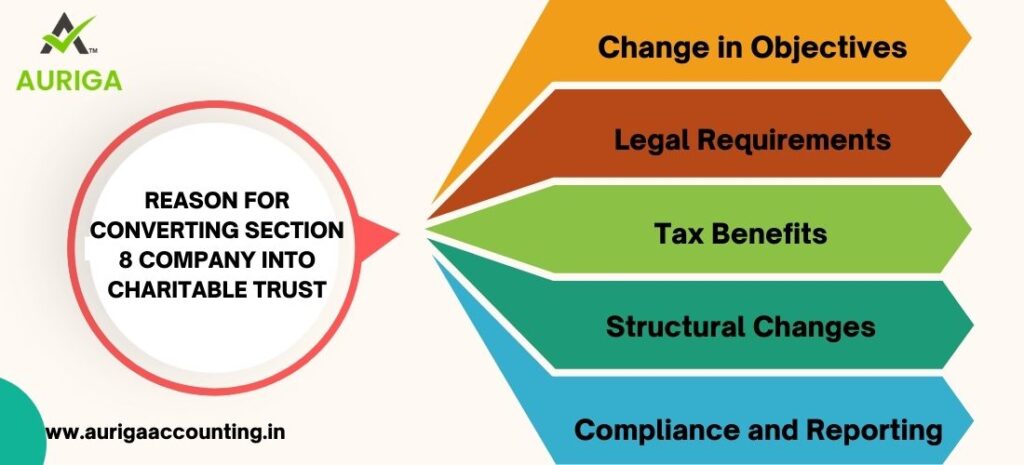
CAN SECTION 8 COMPANY BE CONVERTED INTO CHARITABLE TRUST?
Introduction
ToggleYOU NEED TO KNOW CAN SECTION 8 COMPANY BE CONVERTED INTO CHARITABLE TRUST?
Yes Section 8 Companies converted into a charitable trust, subject to compliance with applicable legal procedures. The conversion process typically involves obtaining necessary approvals from relevant authorities, such as the Registrar of Companies and the Income Tax Department. The company’s memorandum and articles of association would need to be amended to align with the requirements of a charitable trust. It’s essential to adhere to the legal and regulatory framework governing such conversions to ensure a smooth transition. Seeking professional advice from legal and financial experts is recommended to navigate the conversion process effectively and maintain compliance.Visitofficialwebsite
UNDERSTANDING SECTION 8 COMPANY AND CHARITABLE TRUST
SECTION 8 COMPANY
A Section 8 Company, as per the Companies Act, 2013, is a form of a nonprofit organization that can be registered with limited liability. It is primarily established for promoting charity, social welfare, education, art, science, sports, research, and other similar objectives. The main features of a Section 8 Company include:
Limited Liability: Members’ liability is limited to the amount unpaid on their shares, ensuring the personal assets of the members are not at risk.
Non-Distribution of Profits: A Section 8 Company cannot distribute its profits among its members. All income and property must be applied solely for promoting the company’s objectives.
Prior Approval: The Central Government or the Regional Director must grant approval for the incorporation of a Section 8 Company.
Tax Benefits: Section 8 Companies enjoy certain tax exemptions and deductions under the Income Tax Act, 1961, subject to meeting specific criteria.
CHARITABLE TRUST
A Charitable Trust, on the other hand, is a legal entity governed by the Indian Trusts Act, 1882. It is established with the primary purpose of advancing charitable, religious, philanthropic, or educational goals. Key features of Charitable Trusts include:
Irrevocable Trust: Once a trust is created, it is typically irrevocable, meaning that it cannot be dissolved or changed without the consent of the beneficiaries or legal authorities.
Trust Deed: A trust is created through a trust deed that outlines its objectives, trustees, and the manner in which the trust will be managed.
Tax Benefits: Charitable Trusts are eligible for tax exemptions under Section 11 and Section 12A of the Income Tax Act, subject to certain conditions.
What is a charitable company under Section 8
A charitable company under Section 8 in India refers to an organization formed under Section 8 of the Companies Act, 2013. Such companies are established for promoting charitable, social, or nonprofit objectives, such as education, art, science, sports, research, or social welfare. A Section 8 company functions as a legal entity with limited liability but operates exclusively for purposes benefiting the community. Unlike typical companies, its profits are reinvested in furthering its objectives. These companies are subject to regulations outlined in the Companies Act, and their primary focus is on serving the public welfare rather than profit distribution among members.
Can a Section 8 company generate revenue
Yes, a Section 8 company in India, despite being a nonprofit organization, is allowed to generate revenue. While the primary focus is on promoting charitable, social, or nonprofit objectives, Section 8 companies can engage in income-generating activities to sustain their operations and further their mission. However, any profits earned cannot be distributed among its members and must be reinvested in the company’s objectives. The generated revenue should be utilized for the organization’s stated purposes, such as education, healthcare, or other social welfare activities. Compliance with applicable laws, transparency, and accountability are essential in managing revenue for Section 8 companies.

REASON FOR CONVERTING SECTION 8 COMPANY INTO CHARITABLE TRUST
Converting a Section 8 Company into a Charitable Trust can be driven by various factors, including:
Change in Objectives: When the organization’s primary objectives shift from those that align with a Section 8 Company to those that are better suited for a Charitable Trust, a conversion may be necessary.
Legal Requirements: The governing laws and regulations for trusts might be more suitable or less restrictive for the organization’s activities, making conversion a logical choice.
Tax Benefits: Charitable Trusts may offer specific tax benefits that are not available to Section 8 Companies or vice versa. A conversion may be carried out to take advantage of these tax benefits.
Structural Changes: Changes in the organization’s management structure or governance model might align better with the characteristics of a Charitable Trust.
Compliance and Reporting: An organization may opt for conversion to simplify or enhance compliance with statutory and regulatory reporting requirements.
How do I dissolve a Section 8 company
Dissolving a Section 8 company in India involves a structured process. Begin by obtaining approval from the Board of Directors and members. Ensure all financial obligations and liabilities are settled. File a petition with the National Company Law Tribunal (NCLT), providing details of the company’s assets, liabilities, and reasons for dissolution. If the NCLT approves, file the dissolution application with the Registrar of Companies (RoC). Publish the notice of dissolution in a newspaper and send notices to creditors. After obtaining the NCLT order and RoC approval, submit the necessary documents to officially dissolve the Section 8 company. Seek professional advice for accurate compliance.
What is the minimum number of members in a Section 8 company
In India, a Section 8 company, governed by Section 8 of the Companies Act, 2013, can be formed with a minimum of two individuals as members. These members can be individuals or corporate entities. Unlike other types of companies, which may require a higher minimum number of members, a Section 8 company allows for a more flexible structure to promote charitable, social, or nonprofit objectives. It’s important to note that the Articles of Association and Memorandum of Association of the Section 8 company should specify the details of the membership structure and other relevant regulations.
Can Section 8 company accept donations
Yes, a Section 8 company in India, registered under Section 8 of the Companies Act, 2013, can accept donations. These companies are formed for promoting various charitable, social, and nonprofit objectives. Accepting donations is a crucial aspect of their funding mechanism to support their activities. However, Section 8 companies must comply with the regulations outlined in the Companies Act and other relevant laws governing nonprofit organizations. They should maintain transparency in financial transactions, follow proper accounting procedures, and use the donated funds exclusively for their stated charitable purposes, as outlined in their memorandum of association.
Does Section 8 company pay tax
Yes, Section 8 companies in India are subject to taxation. While they are formed for charitable or nonprofit purposes, they are not exempt from income tax. However, they can avail themselves of certain tax benefits under the Income Tax Act, such as exemptions on income generated from their charitable activities. To qualify for these exemptions, Section 8 companies must comply with specific conditions and maintain proper documentation. It’s essential for them to file annual tax returns and adhere to the tax regulations applicable to nonprofit organizations. Seeking professional advice can help ensure compliance with tax obligations.
Is Section 8 company a charitable trust
In India, a “Section 8 company” refers to a type of company governed by Section 8 of the Companies Act, 2013. These companies are typically formed for promoting commerce, art, science, sports, education, research, social welfare, religion, charity, protection of the environment, or any other similar objective. Section 8 companies are generally nonprofit organizations, and any profits generated are reinvested in the organization’s objectives.
As for the “100” designation, it’s not clear what it specifically refers to without additional context. If there have been changes or developments in company law or regulations since my last update, I recommend checking with the latest legal resources or consulting with a legal professional in your jurisdiction to get the most accurate and up-to-date information.
STEPS FOR CONVERTING SECTION 8 COMPANY INTO CHARITABLE TRUST
STEP:1 DISSOLUTION OF A SECTION 8 COMPANY
The first step in the conversion process is to obtain approval for the voluntary dissolution of the Section 8 Company. This decision should be made in accordance with the provisions of the Companies Act, 2013, and the organization’s Memorandum of Association (MoA) and Articles of Association (AoA).
The members or governing body of the Section 8 Company should convene meetings to discuss and approve the decision to dissolve the company. The dissolution process should be carried out in compliance with legal and regulatory requirements.
STEP:2 LIQUIDATION OF ASSET AND LIABILITIES
Following the approval of the dissolution, the assets and liabilities of the Section 8 Company need to be liquidated. This involves:
Identifying and valuing all the assets, including property, funds, investments, and any other resources owned by the company.
Identifying and documenting all liabilities, which may include loans, debts, contractual obligations, and pending dues.
Creating a detailed account of the financial position of the company at the time of dissolution.
STEP:3 DRAFTING A TRUST DEED
To proceed with the conversion, you need to create a trust deed that outlines the objectives, management structure, and other critical details of the proposed Charitable Trust. The trust deed is a legally binding document that serves as the constitution of the trust. It should include:
The name and address of the trust.
The objectives and purposes of the trust, specifying that it is being established for charitable or philanthropic activities.
The names of the trustees or board members who will be responsible for managing the trust.
The rules and regulations governing the trust’s operations.
Any other provisions that are relevant to the trust’s functioning.
The trust deed should comply with the laws governing charitable trusts in India, and it should be drafted carefully to ensure that the trust’s objectives align with those of the converted Section 8 Company.
STEP:4 REGISTRATION OF THE CHARITABLE TRUST
The trust deed must be registered under the Indian Registration Act, 1908. Registration is essential to provide legal recognition to the trust and its objectives. The registration process involves the following steps:
Prepare the trust deed in accordance with the applicable laws.
Visit the local registrar or sub-registrar of assurances in your jurisdiction.
Submit the trust deed along with the necessary supporting documents and a prescribed registration fee.
After a review of the documents, the registrar will register the trust deed and provide a certificate of registration.
The registration certificate serves as proof of the trust’s legal existence and its objectives. It is a crucial document that may be required when dealing with various authorities, including tax authorities and financial institutions.
STEP:5 TRANSFER OF ASSET AND LIABILITIES
Once the Charitable Trust is registered, the next step is to transfer the assets, liabilities, and any surplus funds from the Section 8 Company to the newly formed trust. This should be done in accordance with the provisions of the trust deed and the laws governing such transfers.
Assets: The assets of the Section 8 Company, such as funds, investments, property, or any other resources, should be legally transferred to the Charitable Trust.
Liabilities: The liabilities and debts of the Section 8 Company should be settled using the company’s
HOW AURIGA ACCOUNTIG HELP YOU TO CONVERTING SECTION 8 COMPANY INTO CHARITABLE TRUST
Legal and Regulatory Expertise: Companies like Auriga Accounting may have legal experts who are well-versed in the legal and regulatory requirements governing Section 8 Companies and Charitable Trusts. They can guide you through the legal aspects of the conversion, ensuring compliance with relevant laws and regulations.
Documentation and Paperwork: Converting a Section 8 Company into a Charitable Trust involves a significant amount of documentation, including trust deeds, regulatory filings, and asset transfers. Accounting firms can help prepare and review these documents to ensure accuracy and completeness.
Asset and Liability Evaluation: Auriga Accounting can assist in evaluating the assets and liabilities of the Section 8 Company, ensuring that all financial matters are appropriately addressed during the conversion process.
Tax and Financial Planning: Auriga Accounting can provide guidance on the financial implications of the conversion, including any tax considerations and strategies to optimize financial aspects.
Compliance and Reporting: Ensuring compliance with applicable laws and regulatory bodies is crucial during the conversion process. Accounting firms can help with compliance and reporting requirements, which may vary depending on the location and nature of the organization.
Risk Assessment: Auriga Accounting can help identify and mitigate potential risks associated with the conversion, ensuring that the organization transitions smoothly and without unexpected complications.
Assistance with Transfers: Transferring assets and liabilities from the Section 8 Company to the Charitable Trust requires careful accounting and legal work. Accounting firms can assist in these transfer processes.
Tax Exemption and Benefits: Charitable Trusts in India may be eligible for specific tax exemptions and benefits. Accounting firms can provide guidance on how to avail these benefits after the conversion.
Customized Solutions: A reputable accounting and legal services firm can tailor its services to the unique needs and goals of the organization, ensuring that the conversion aligns with the organization’s mission and objectives.












